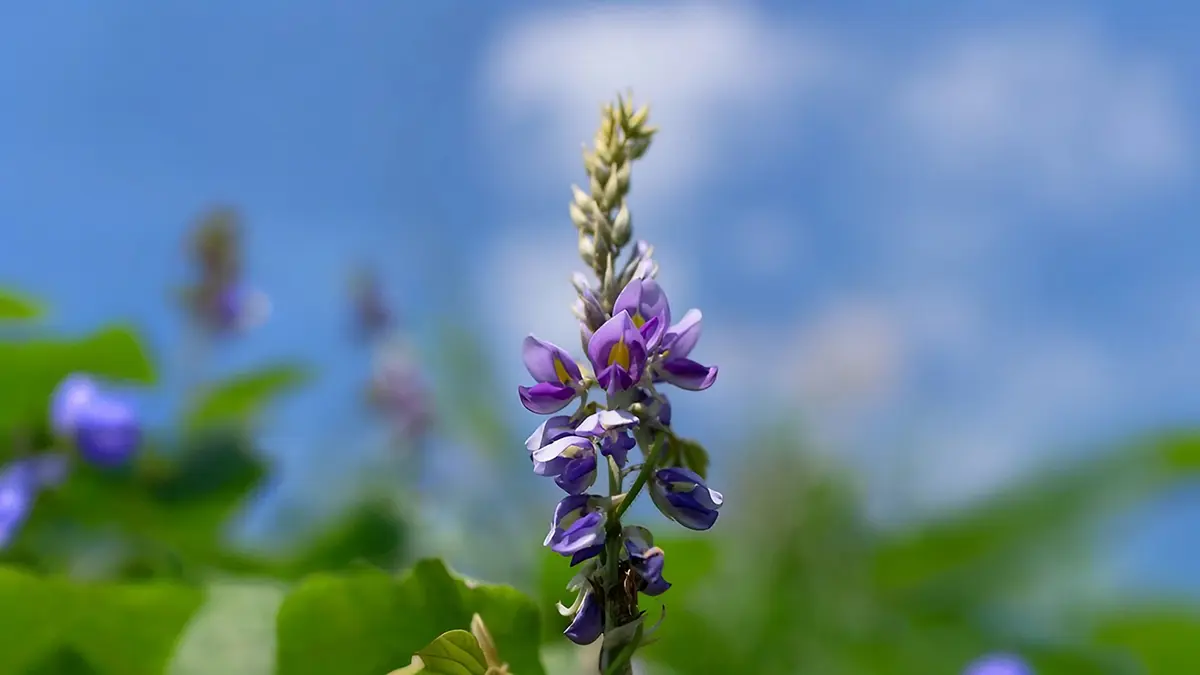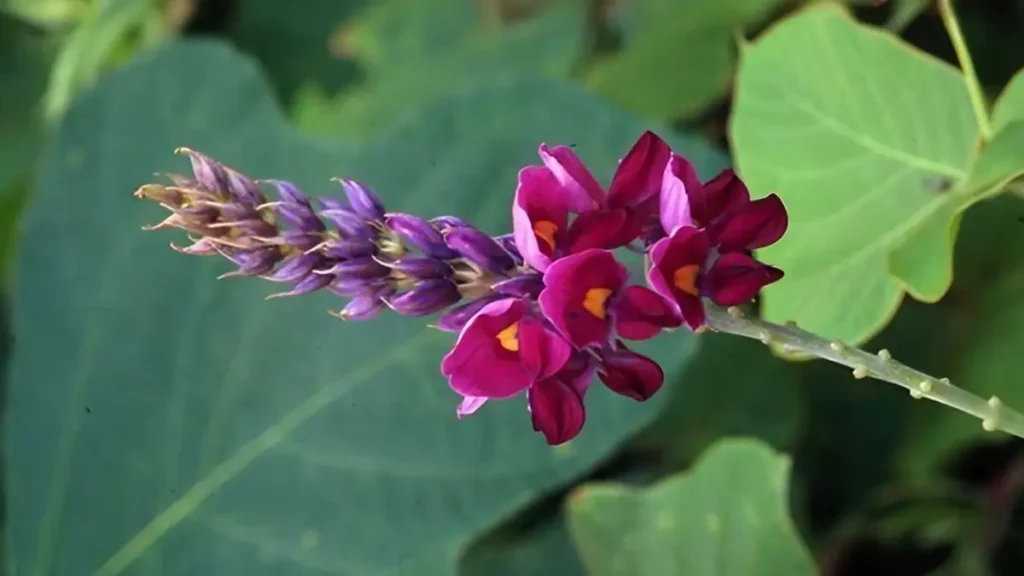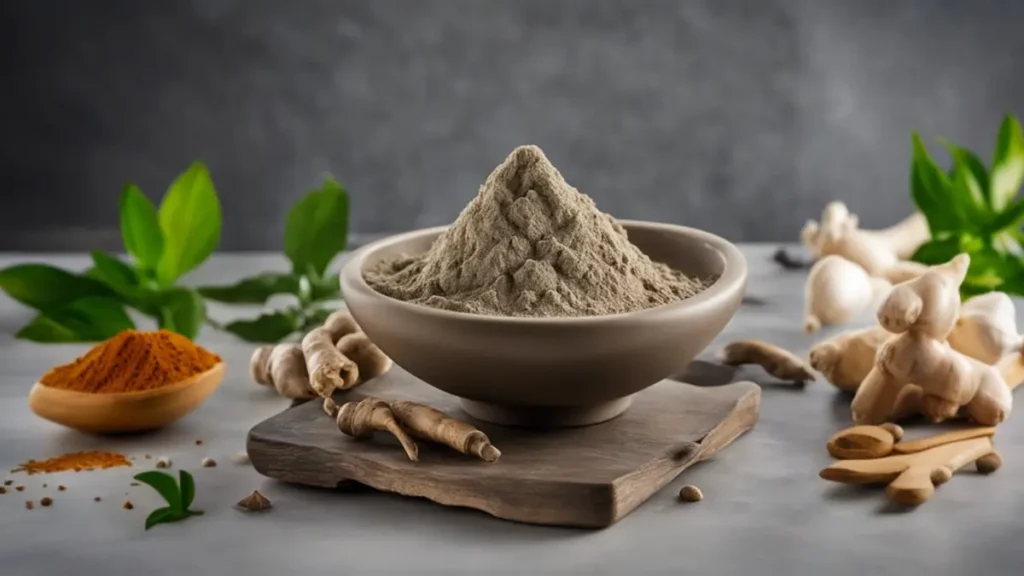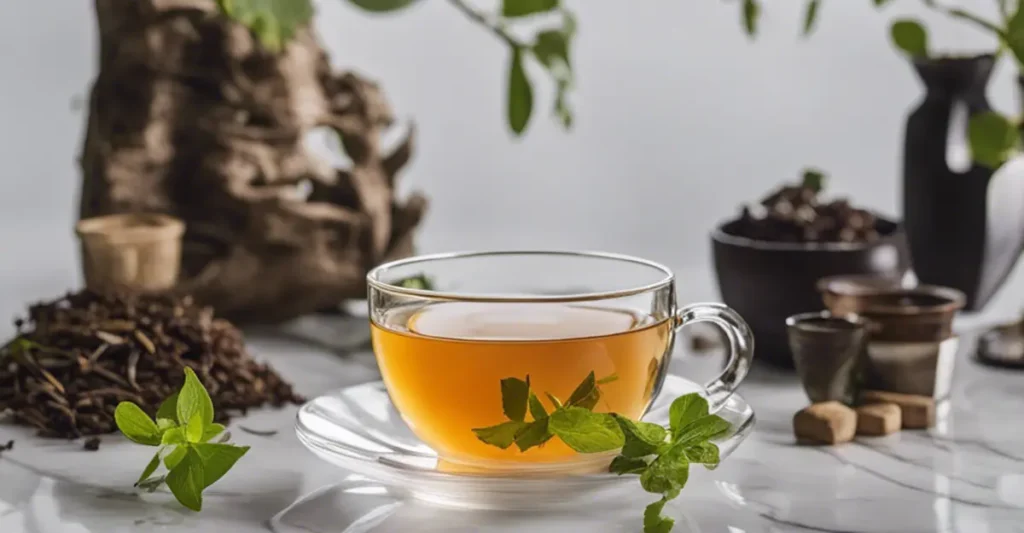Your cart is currently empty!

Kudzu is a plant that has been used for centuries in traditional medicine for its various health benefits. But did you know that it can also help you improve your skin and hair? In this guide to kudzu, I will help you explore how kudzu products can nourish, moisturize, and protect your skin and hair from environmental damage.
I will also share some tips on how to use kudzu for your beauty routine, and how to select the best kudzu products on the market. We will dispel some common myths and misconceptions about it along the way.
Whether you are looking for a natural way to treat aging, dark circles, acne, dryness, or graying, hair fall or scalp issues, kudzu might be the answer you are looking for. Read on to discover the amazing benefits of this fabulous plant for your skin and hair.
Table of Contents
I. Kudzu: The Magic Herb
Kudzu, scientifically known as Pueraria lobata, is a robust, tri-foliate, semi-woody perennial vine belonging to the Fabaceae family. This vine boasts fragrant, pea-like flowers that often drape over other vegetation.
Kudzu’s popularity stems from its rich history of over two millennia, cherished by Asian cultures like China, Taiwan, Japan, and India, with historical records from China dating back to 1578, mentioning the use of dried and diced kudzu roots for medicinal purposes.
Traditional Uses
The plant’s traditional uses span nutritional and medicinal purposes in Ayurveda and traditional Chinese practices. Kudzu extracts offer an array of health benefits, including anti-cancer, anti-diabetic, anti-inflammatory properties, making it a versatile and useful plant.
In both Ayurveda and traditional Chinese practices, the tubers and leaves of the kudzu plant find special mention. Kudzu extracts exhibit a wide array of beneficial effects, including anti-oxidant, anti-stress, anti-ulcerogenic, cardio-protective, hypolipidemic, hepatoprotective, immunomodulatory, nephroprotective, nootropic, neuroprotective, and wound-healing properties.
Increasing Popularity
In recent years, there has been a growing fascination in Western countries with the traditional Asian plant particularly in the realm of skincare and hair care. Fueled by recent scientific studies exploring its benefits and efficacy in health, skin and hair care, consumers are increasingly turning to Kudzu-based products for their natural and sustainable qualities.
Kudzu’s environmentally friendly cultivation and its wide range of applications based on extracts derived from its roots, flowers and leaves from creams and serums to shampoos and conditioners have made it a sought-after ingredient in the beauty industry.
As the awareness of its benefits continues to spread, we expect to see even more skincare and hair care products harnessing the power of this remarkable plant and more and more people creating their own kudzu beauty routines. With its traditional roots and modern appeal, Kudzu is proving to be a natural solution for those seeking healthier, more radiant skin and hair.
II. Kudzu Hair Care Benefits

Kudzu has traditionally been used for hair loss, dull, lifeless and brittle hair or itchy scalp and also for chronic scalp sensitivity, scaling, redness, burning, dandruff etc.
Kudzu root is a rich source of essential nutrients for the hair, including vitamins A, C, and E, as well as minerals like iron, zinc, and copper. Kudzu roots are also a rich source of over seventy phytochemicals, with isoflavonoids and triterpenoids as the major constituents. Isoflavonoids which are predominantly beneficial are puerarin, daidzein and genistein. These isoflavones have powerful antioxidant properties effectively neutralizing oxidative stress and inflammation at the cellular level in hair follicles and scalp skin and promoting hair growth. Let us look at the components of typical kudzu extracts.
A. Strengthening and nourishing hair follicles
Kudzu root contains quercetin, a flavonoid with antioxidant and anti-inflammatory properties. Quercetin is a flavonoid with antioxidant and anti-inflammatory properties. It is found in many fruits and vegetables, including kudzu root. Quercetin works to protect hair follicles from free radical damage. Free radicals are unstable molecules that can damage cells and lead to hair loss.
Kudzu also contains isoflavones, plant compounds that mimic the effects of estrogen. Estrogen is important for hair growth, and kudzu isoflavones may help to boost hair growth by stimulating the production of keratin, the main protein in hair.
Kudzu root contains polysaccharides, which are carbohydrates that are found in many plants. Polysaccharides help to retain moisture, which is important for keeping the scalp and hair hydrated.
B. Managing scalp conditions
Dandruff and itchiness are common scalp conditions that can be caused by a variety of factors, including dryness, irritation, and fungal infection. Kudzu may help to manage these conditions by:
- Reducing inflammation: Quercetin helps to reduce inflammation on the scalp, which can lead to hair loss. Kudzu’s anti-inflammatory properties can relieve dandruff and itchiness as well.
- Moisturizing the scalp: Kudzu root polysaccharides can help to moisturize and hydrate the scalp. This can help to reduce dryness and irritation, which can trigger dandruff and itchiness.
- Fighting fungal infection: Kudzu contains compounds that have antifungal properties. These compounds may help to fight fungal infections that can cause scalp problems such as dandruff and seborrheic dermatitis.
C. Other benefits
In addition to strengthening and nourishing hair follicles and managing scalp conditions, kudzu may also offer the following benefits for hair care:
Promoting hair growth: Kudzu’s isoflavone content may help to promote hair growth by stimulating the production of keratin.
Reducing hair loss: Kudzu’s anti-inflammatory and antioxidant properties may help to reduce hair loss by protecting hair follicles from damage and inflammation.
Improving hair texture and shine: Kudzu’s moisturizing and nourishing properties may help to improve hair texture and shine.
Although kudzu is a relatively new ingredient in hair care products, more and more research is being done to explore its full range of benefits. The existing research suggests that kudzu is a promising ingredient for promoting healthy hair growth and scalp health, working at the cellular level to reverse the impact of all external and internal stressors.
Easily incorporate Kudzu in your hair care routine with Dr. Pooja’s Trqois Terra Scalp & Hair Rescue Serum and prevent greying, make your scalp and hair roots healthier. A great addition to your routine for shiny, soft, and smooth hair is our Natural Anti-Frizz & UV Protect Hair Mist.
III. Kudzu Skin Care Benefits

A. Anti-aging properties
One of the most promising benefits of kudzu for skin care is its anti-aging properties. Kudzu is rich in antioxidants, which can help to protect the skin from free radical damage. Free radicals are unstable molecules that can damage cells and contribute to the signs of skin aging, such as wrinkles, fine lines, and age spots.
Kudzu contains a variety of antioxidants, including vitamins A, C, and E, as well as flavonoids and isoflavones. These antioxidants work together to neutralize free radicals, protect the skin from damage and reverse the impact of aging on skin.
- Potent anti-oxidant action: Kudzu isoflavones neutralize the various Reactive Oxygen Species (ROS) generated due to aging and hence prevent & reverse age-related damage to epidermal & dermal skin layers.
- Estrogenic activity: Puerarin, daidzein and genistein are phytoestrogens and mimic actions of estrogen on skin. Estrogens modulate epidermal keratinocytes, dermal fibroblasts and melanocytes along with skin appendages like hair follicles & sebaceous glands. Aging related loss of function in these cells can possibly be improved by kudzu isoflavones. Although, more controlled trials are needed to prove these benefits.
- Dermal matrix effects: Kudzu isoflavones help to improve hyaluronic acid production and increase proliferation of dermal fibroblasts.
In addition to its antioxidant content, kudzu also contains compounds that may help to reduce the appearance of wrinkles and promote youthful skin. For example, kudzu contains isoflavones, which can help to increase collagen production. Collagen is a protein that helps to keep the skin firm and elastic.
B. Moisturizing and soothing effects
Kudzu is also known for its moisturizing and soothing effects. Kudzu contains polysaccharides, which are carbohydrates that can help to retain moisture. This makes kudzu a good choice for people with dry or sensitive skin.
Kudzu also contains compounds that have anti-inflammatory and antioxidant properties. These compounds can help to calm skin inflammation and irritation. This makes kudzu a good choice for people with skin conditions such as eczema, psoriasis, and rosacea.
C. Other benefits
In addition to its anti-aging and moisturizing properties, kudzu may also offer the following benefits for skin care:
UV protection: Kudzu contains compounds that may help to protect the skin from UV radiation. UV radiation from the sun is one of the leading causes of premature skin aging. Kudzu has the ability to decrease prostaglandin E2 and TNF alpha release, both of which are involved in inflammatory processes.
Studies on mice skin have shown significant protective effects of topical kudzu preparation, as it helped in reducing skin wrinkles, and increased levels of anti-oxidant enzymes like superoxide dismutase.
Under-eye skin: Kudzu may be beneficial for the delicate skin under the eyes. Kudzu’s moisturizing and soothing properties can help to reduce the appearance of dark circles and puffiness.
Fine lines and wrinkles: Kudzu may help to reduce the appearance of fine lines and wrinkles. Kudzu’s antioxidant and anti-inflammatory properties can help to protect the skin from damage and promote collagen production.
Skin-Lightening: Kudzu extracts inhibit melanogenesis by inhibiting tyrosinase enzyme involved in melanin synthesis and hence helps in reducing patchy or diffuse tan and evens out the complexion.
Kudzu is a promising ingredient for skin care due to its anti-aging, moisturizing, and soothing properties. It may help to reduce the appearance of wrinkles and fine lines, improve skin hydration, and calm skin inflammation and irritation. Kudzu can be used in a variety of ways for skin care, including as a powder, tea, or in skin care products.
Trqois Terra’s pioneering kudzu-based skin care products are a great way to discover the goodness of Kudzu in a easy and convenient manner. Say good bye to dark circles and fine lines and get fresh-looking rejuvenated eyes with Dr. Pooja’s Trqois Terra Intense Nourishing Under Eye Cream.
IV. Myths About Kudzu

Kudzu is a fast-growing vine native to Asia that has been used in traditional Chinese medicine for centuries. It has been gaining popularity in the Western world in recent years due to its wide range of potential health benefits, including its ability to promote skin and hair health, boost the immune system, reduce inflammation, and protect against cancer.
However, I often hear people vilify kudzu as an invasive weed. It is true that kudzu can be a nuisance plant in some areas, but it is important to dispel some of the myths about this controversial vine.
Myth: Kudzu is useless.
Kudzu is a valuable source of antioxidants, flavonoids, and isoflavones. These compounds have a variety of health benefits, including:
- Boosting the immune system
- Reducing inflammation
- Protecting against cancer
- Improving cardiovascular health
- Promoting healthy hair and skin
- Aiding in alcohol de addiction
Kudzu root can also be used to make a variety of products, including food, beverages, and supplements. Kudzu root is also used in traditional Chinese medicine to treat a variety of conditions, including liver disease, diabetes, and menopause symptoms.
Myth: Kudzu is dangerous to eat.
Kudzu root is edible and has been consumed safely for centuries. It is a good source of dietary fiber, protein, and vitamins. Kudzu root can be eaten fresh, cooked, or dried. It can also be made into a tea or powder.
However, it is important to note that kudzu leaves and stems are not edible. They contain toxins that can cause stomach upset and vomiting.
Myth: Kudzu is impossible to kill.
Kudzu is a resilient plant, but it is not impossible to kill. There are a number of ways to control kudzu, including herbicides, mechanical removal, and grazing animals.
Myth: Kudzu kills trees.
Kudzu does not kill trees directly. However, it can compete with trees for sunlight and resources. If kudzu is left unchecked, it can eventually overshadow trees and prevent them from getting the sunlight they need to survive.
Myth: Kudzu is a waste of time and money to use for skin and hair care.
Kudzu has been shown to have a number of benefits for skin and hair care. Kudzu root powder can be used to make a paste that can be applied to the skin to moisturize the skin, reduce inflammation, and improve skin elasticity. Kudzu root powder can also be added to shampoos and conditioners to promote hair growth and improve hair texture.
Kudzu tea can also be used for hair and skin care. Kudzu tea contains antioxidants and other beneficial compounds that can help to protect the skin from damage and promote hair growth. Kudzu tea can be applied to the skin using a cotton ball or washcloth. It can also be used to rinse the hair after shampooing.
Kudzu based Dr. Pooja’s Trqois Terra Face Cream with SPF-15 can be used to moisturize the skin, reduce inflammation, and improve skin elasticity.
Kudzu is a complex plant with both positive and negative aspects. It is important to be aware of the potential risks of kudzu, such as its invasive nature. However, it is also important to be aware of the many benefits of kudzu root, especially for skin and hair care.
V. Why Use Kudzu for Hair and Skin Care

A. Natural and plant-based alternative
Natural ingredients are becoming increasingly popular in hair and skin care products, and for good reason. Natural ingredients are often gentler on the skin and hair than synthetic alternatives. They are also less likely to cause irritation or allergic reactions.
Kudzu is a natural plant-based ingredient that offers a number of potential benefits for hair and skin care. Kudzu is native to Asia and has been used in traditional Chinese medicine for centuries. Kudzu root is particularly rich in antioxidants, flavonoids, and isoflavones. These compounds have a variety of benefits for the hair and skin, including:
- Boosting collagen production
- Reducing inflammation
- Protecting against free radical damage
- Moisturizing the skin and hair
- Promoting hair growth
How and why are natural ingredients better in hair and skin care products than synthetic alternatives?
Natural ingredients are often more gentle on the skin and hair than synthetic alternatives. This is because natural ingredients are more biocompatible with the human body. Synthetic ingredients, on the other hand, can be more irritating and less effective.
Natural ingredients are also more likely to be sustainable than synthetic alternatives. Synthetic ingredients are often derived from petroleum products, which are a non-renewable resource. Natural ingredients, on the other hand, are derived from plants, which are a renewable resource.
B. Potential synergy of kudzu compounds
Kudzu root contains a variety of beneficial compounds, including antioxidants, flavonoids, and isoflavones. These compounds work together to provide multiple benefits for the hair and skin.
For example, antioxidants can help to protect the hair and skin from free radical damage. Free radicals are unstable molecules that can damage cells and contribute to the signs of aging. Flavonoids can help to reduce inflammation and promote hair growth. Isoflavones can help to boost collagen production and improve skin elasticity.
Advantages of kudzu-based products that harness the synergistic effects of these compounds
Kudzu-based products offer a number of advantages over other hair and skin care products. Kudzu-based products are typically more gentle and effective than products that contain synthetic ingredients. Kudzu-based products are also more sustainable.
Additionally, kudzu-based products can harness the synergistic effects of the various compounds in kudzu root. This means that kudzu-based products can provide multiple benefits for the hair and skin, such as:
- Reducing the appearance of wrinkles and fine lines
- Improving skin elasticity and firmness
- Moisturizing the skin and hair
- Promoting hair growth
- Protecting the skin from free radical damage
- Reducing inflammation
Kudzu is a great natural plant-based alternative to synthetic hair and skin care ingredients. Kudzu is also rich in antioxidants, flavonoids, and isoflavones, which have a variety of benefits for the hair and skin. Kudzu-based products can harness the synergistic effects of these compounds to provide multiple benefits for the hair and skin.
VI. Why Is Kudzu Better: A Comparative Analysis
A. Kudzu and other popular hair and skin care ingredients
Kudzu offers a number of unique properties and potential advantages over other ingredients commonly used in hair and skin care products. Some of these include:
Natural and plant-based: Kudzu is a natural plant-based ingredient, while many other popular hair and skin care ingredients are synthetic. Synthetic ingredients can be more irritating and less effective than natural ingredients.
Rich in beneficial compounds: Kudzu is rich in antioxidants, flavonoids, and isoflavones. These compounds have a variety of benefits for the hair and skin, including boosting collagen production, reducing inflammation, and protecting against free radical damage.

Safe and well-tolerated: Kudzu is generally safe and well-tolerated. It is unlikely to cause irritation or allergic reactions, even in people with sensitive skin.
Some popular hair and skin care ingredients that kudzu may be superior to include:
Retinol: Retinol is a vitamin A derivative that is known for its anti-aging benefits. However, retinol can be irritating, especially for people with sensitive skin. Kudzu is a gentler alternative to retinol that offers similar anti-aging benefits.
Hyaluronic acid: Hyaluronic acid is a humectant that helps to hydrate the skin. However, hyaluronic acid can be expensive and difficult to find in high-quality products. Kudzu is a more affordable and accessible alternative to hyaluronic acid that offers similar hydrating benefits.
Collagen: Collagen is a protein that is essential for maintaining skin elasticity. However, collagen supplements can be ineffective and expensive. Kudzu is a natural source of compounds that can boost collagen production.
B. Scientific studies and research on efficacy of kudzu for hair and skin care
A growing body of scientific research supports the use of kudzu for hair and skin care. Let’s explore some of the studies that have investigated the effects of kudzu root on skin and hair care.
One of the main benefits of kudzu root is its estrogenic activity, which means it can mimic or modulate the effects of estrogen in the body. Estrogen is a hormone that plays a vital role in female reproductive health, as well as in maintaining bone density, skin elasticity, hair growth, and breast size. However, estrogen levels decline with age, especially after menopause, which can lead to various symptoms such as hot flashes, vaginal dryness, osteoporosis, wrinkles, and hair loss. Kudzu root may help alleviate some of these symptoms by providing natural phytoestrogens that can bind to estrogen receptors and stimulate or inhibit their actions.
For example, one study found that kudzu root extract may have beneficial effects on skin and hair by enhancing collagen synthesis, reducing oxidative stress, and inhibiting inflammation.
This randomized, double-blind clinical trial was performed on a group of 44 middle-aged women over a period of 24 weeks in order to examine the effects of APHG-1001, a compound found in the extract from Kudzu, on graying hair. This clinical trial revealed that kudzu extract could prevent the development of new gray hair without any remarkable adverse effects.
Another study found a topical application of kudzu extract to promote hair growth in mice and suggested the use of kudzu in alopecia treatment formulations as well.
A team of researchers from South Korea published a study that showed how kudzu can protect against skin aging caused by ultraviolet-B (UVB) radiation. UVB is a type of sunlight that can damage the skin and cause wrinkles, sagging, and inflammation. The study suggests that kudzu can be a potential natural ingredient for skin care products that can prevent or delay skin aging.
A paper investigating the use of kudzu waste concluded that kudzu stem extract could be used as a natural type of skin-whitening agent in skin care products. This was confirmed by another team in this paper.
Kudzu offers many natural plant-based ingredients that offer a number of unique properties and potential advantages over other ingredients commonly used in hair and skin care products. Kudzu is rich in beneficial compounds, safe and well-tolerated, and supported by a growing body of scientific research. If you are looking for natural and effective hair and skin care products, consider using products that contain kudzu root extract.
If you are interested in trying kudzu root for yourself, consult your doctor before taking any supplements or applying any products to your skin.
VII. How to Incorporate Kudzu into Hair and Skin Care Routine

How to select Kudzu based Beauty products
When selecting kudzu-based beauty products, it is important to choose products that contain a high percentage of kudzu root extract. Look for products that list kudzu root extract as one of the top ingredients. It is also important to choose products from reputable brands.
Here are some tips for selecting kudzu-based beauty products:
- Read the label carefully to check the ingredients list. Look for products that contain a kudzu extract.
- Look for nature-based products.
- Look for products that have been clinically tested and proven to be effective.
- Consider your skin type and hair type when choosing products. For example, if you have sensitive skin, you may want to choose a kudzu-based product that is fragrance-free and non-comedogenic.
How to use kudzu root extract for beauty routine
Kudzu root extract can be used in a variety of ways for hair and skin care. Here are a few tips:
For skin care: You can apply kudzu root extract directly to your skin or use it in conjunction with other skin care products. To apply kudzu root extract directly to your skin, simply mix a small amount of the extract with water to form a paste. Apply the paste to your skin and leave it on for 15-20 minutes before rinsing it off with warm water. You can also add kudzu root extract to your favorite moisturizer or face mask.
For hair care: You can use kudzu root extract to promote hair growth, reduce hair loss, and improve the overall health of your hair. To promote hair growth, apply kudzu root extract to your scalp and massage it in gently. Leave the extract on your scalp for 30-60 minutes before rinsing it off with warm water. You can also add kudzu root extract to your shampoo or conditioner.
Tips and tricks about using kudzu-based products for hair and skin care
Here are a few tips and tricks for using kudzu-based products for hair and skin care:
Be consistent: To get the best results, it is important to use kudzu-based products consistently. Aim to use kudzu-based products at least 3-4 times per week.
Do a patch test before using a new product: If you have sensitive skin, it is always a good idea to do a patch test before using a new product. To do a patch test, apply a small amount of the product to a small area of your skin, such as the inside of your wrist. Wait 24 hours to see if there is any reaction. If there is no reaction, you can use the product on a larger area of your skin.
Store kudzu-based products in a cool, dark place: Kudzu-based products can be stored in a cool, dark place for up to 6 months.

If you want a easier way to incorporate Kudzu in your beauty routine, I have just the products for you. I have helped formulate many skin and hair care products that are nature-based and use Kudzu as one of main ingredients. I highly recommend our Scalp & Hair Rescue Serum and Intense Nourishing Under-Eye Cream. You can explore all products here.
Coming up with a kudzu beauty routine is not hard. If you have any doubts or need any help, consult your dermatologist for better guidance.
VIII. Conclusion
Kudzu is a versatile and beneficial ingredient for hair and skin care. It is rich in antioxidants, flavonoids, and isoflavones, which have a variety of benefits for the hair and skin, including:
- Boosting collagen production
- Reducing inflammation
- Protecting against free radical damage
- Moisturizing the skin and hair
- Promoting hair growth
Kudzu-based products are becoming increasingly popular in the beauty industry due to their natural, effective, and affordable properties. Kudzu-based products can be used to address a variety of hair and skin concerns, such as:
- Wrinkles and fine lines
- Dry skin
- UV protection
- Under-eye skin dark circles
- Hair loss
- Greying of hair
If you are looking for natural and effective hair and skin care products, consider using products that contain kudzu root extract. Kudzu is a versatile ingredient with the potential to revolutionize the beauty industry.
2 responses to “Ultimate Guide to Kudzu Hair and Skin Care”

vurcazkircazpatliycaz.Do2qpaGi8DOt

I’ve been browsing the internet for more than three hours, and I haven’t seen any posts as fascinating as yours. I think it’s well worth the investment. If more bloggers and website owners created content as good as you do, the internet would be significantly more useful than it already is.











Leave a Reply